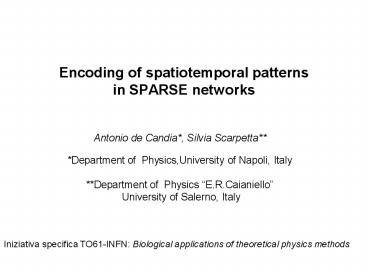Encoding of spatiotemporal patterns in SPARSE networks - PowerPoint PPT Presentation
1 / 13
Title:
Encoding of spatiotemporal patterns in SPARSE networks
Description:
Iniziativa specifica TO61-INFN: Biological applications of ... From Bi and Poo J.Neurosci.1998. STDP in cultures of dissociated rat hippocampal neurons ... – PowerPoint PPT presentation
Number of Views:52
Avg rating:3.0/5.0
Title: Encoding of spatiotemporal patterns in SPARSE networks
1
Encoding of spatiotemporal patternsin SPARSE
networks
- Antonio de Candia, Silvia Scarpetta
- Department of Physics,University of Napoli,
Italy - Department of Physics E.R.Caianiello
- University of Salerno, Italy
Iniziativa specifica TO61-INFN Biological
applications of theoretical physics methods
2
Oscillations of neural assemblies
In cortex, phase locked oscillations of neural
assemblies are used for a wide variety of tasks,
including coding of information and memory
consolidation.(review Neural oscillations in
cortexBuzsaki et al, Science 2004 -Network
Oscillations T. Sejnowski Jour.Neurosc.
2006) Phase relationship is relevant Time
compressed Replay of sequences has been observed
3
Time compressed REPLAY of sequences
- D.R. Euston, M. Tatsuno, Bruce L. McNaughton
Science 2007 - Fast-Forward Playback of Recent Memory Sequences
in prefrontal Cortex During Sleep.
- Reverse replay has also been observed Reverse
replay of behavioural sequences in hippocampal
place cell s during the awake state D.Foster M.
Wilson Nature 2006
4
Models of single neuron
- Multi-compartments models
- Hodgkin-Huxley type models
- Spike Response Models
- IntegrateFiring models (IF)
- Membrane Potential and Rate models
- Spin Models
5
Spike Timing Dependent Plasticity
Experiments Markram et al. Science1997
(slices somatosensory cortex) Bi and Poo 1998
(cultures of dissociated rat hippocampal neurons)
LTP
LTD
From Bi and Poo J.Neurosci.1998 STDP in cultures
of dissociated rat hippocampal neurons
Learning is driven by crosscorrelations on
timescale of learning kernel A(t)
6
Setting Jij with STDP
Imprinting oscillatory patterns
7
The network
- Spin model
- With STDP plasticity
- Sparse connectivity
8
Network topology
- 3D lattice
- Sparse network, with zltltN connections per neuron
- gz long range , and (1-g)z short range
9
Definition of Order Parameters
complex quantities
Order parameter vs time
Units activity vs time
10
Capacity vs. Topology
30 long range alwready gives very good
performance
N13824
Capacity P versus number z of connections per
node, for different percent of long range
connections g
11
Capacity vs Topology
- Capacity P versus percent of long range g
N 13824 Z178
Clustering coefficient vs g DCC-Crand
Experimental measures in C.elegans give DC
0.23 AchacosoYamamoto Neuroanatomy of C-elegans
for computation (CRC-Press 1992)
P max number of retrievable patterns (Pattern is
retrieved if order parameter m gt0.45)
12
Clustering coefficient vs g DCC-Crand
Experimental measures in C.elegans give DC
0.23 AchacosoYamamoto Neuroanatomy of C-elegans
for computation (CRC-Press 1992)
13
Optimum capacity
Assuming 1 long range connection cost as 3 short
range connections Capacity P is show at constant
cost, as a function of DC
3NL NS 170 N 13824 DC C - Crand































